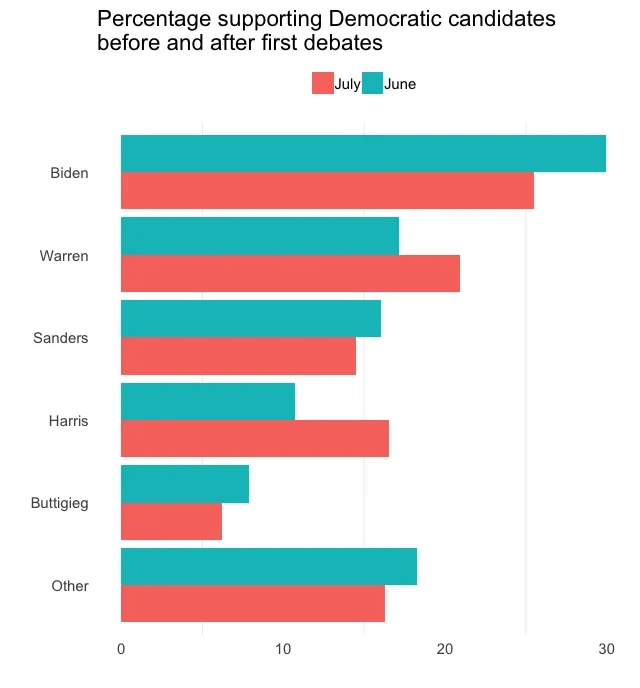The second wave of the CBS/YouGov Delegate Model was released this morning on Face the Nation. We are still six months away from any delegates actually being chosen, but the data do suggest how the race is shaping up.
We have a "top tier" of candidates polling in double digits: Joe Biden, Kamala Harris, Bernie Sanders, and Elizabeth Warren, with Pete Buttigieg just below that level. The remaining twenty or so candidates don't seem to be getting any traction with Democratic primary voters.
Between the first wave, conducted May 31-June 12, and the second, conducted July 9-18, there were a pair of debates on MSNBC featuring 20 of the two dozen or so major candidates. In the press following the debates, the performances of Harris and Warren were praised, while those of Biden and Sanders were panned. In our polls, the two women have gained at the expense of the two men, so, for now at least, it looks like a fairly tight four-way race.
Of course, a month ago it seemed like Joe Biden held a commanding lead and the race would soon be over. Voters change their minds. Which candidate is leading the horserace is less interesting than how voters are switching their preferences overs the candidates. Because our delegate tracking contains large numbers of reinterviews of the same voters, we are able to identify which types of voters actually switched.
A note of caution: this analysis is based only upon the 4,718 democratic and democratic-leaning voters who were interviewed in both the June and July waves. We reweighted the sample to match demographic and candidate preferences in the baseline wave. This eliminates the effects of differential recontact rates, but the numbers are slightly different from the full-sample results in the Delegate Model. Also, the sample differs from other polls because it is limited to the 18 early primary and caucus states, not Democrats nationally.

The biggest loser between the June and July surveys was Joe Biden, who dropped almost five points (from 30.0% to 25.5%). Bernie Sanders fell a bit less than two points (from 16.0% to 14.5%) as did Pete Buttigieg (from 7.9% to 6.2%). The biggest gainer was Kamala Harris, who picked up almost six points (from 10.7% to 16.5%). Elizabeth Warren picked up almost four points (from 17.2% to 20.9%). There was some winnowing of the remaining twenty or so remaining candidates, who dropped collectively by two points (from 18.3% to 16.3%).
Together, Harris and Warren gained ten points. Where did this gain come from? For Harris, the pickup came almost entirely from voters who previously preferred Biden or one of the second tier candidates (anyone other than the top five). Warren's smaller gain was distributed more evenly. She picked up about a point each from prior supporters of Biden, Buttigieg, and Sanders. She lost about half a point to Harris, but this was offset by a gain of the same size from second tier candidates.













